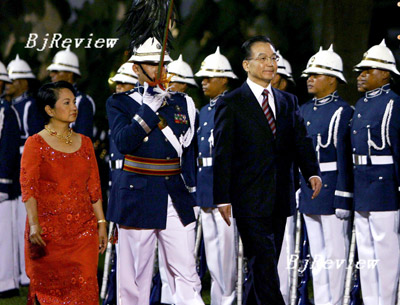
Addressing the Second East Asia Summit in Cebu, the Philippines, Chinese Premier Wen Jiabao underscored openness in East Asian cooperation. "Participation by countries and organizations outside the region should be welcome to widen the scope and reinforce the foundation of the cooperation," he said.
However, China is explicit regarding the backbone of the cooperative process. It supports the Association of Southeast Asian Nations (ASEAN) in continuing to play a leading role in East Asian cooperation, Wen stressed.
The premier was in the Philippines from January 13-16 for a series of East Asian summits, including the 10th ASEAN-China Summit, the 10th ASEAN Plus China, Japan and South Korea (ASEAN Plus Three) Summit, the Second East Asia Summit and the Seventh Chinese, Japanese and South Korean Leaders' Meeting, in Cebu and an official visit to Manila.
The premier's view on East Asian cooperation is echoed by Chinese scholars. They believe that ASEAN will strengthen its status as a leading player in East Asian cooperation with regional integration further deepening.
A common voice
ASEAN leaders convened their own summit in Cebu on January 13. Among the wide-ranging topics discussed, Zhai Kun, an expert on Southeast Asian affairs with the China Institutes of Contemporary International Relations, identified three "historical decisions" concerning the organization's long-term planning, institutional development and cooperation on antiterrorism.
Leaders of the ASEAN member countries promised to establish an ASEAN Community by 2015, five years ahead of schedule. They issued a declaration on drafting the blueprint of the ASEAN Charter, which is expected to go through final approval at the next ASEAN Summit in Singapore in November this year. They also signed their first convention on fighting terrorism.
In an article published by the official newspaper People's Daily, Zhai analyzed the far-reaching implications of these initiatives.
First, they have charted the course for Southeast Asia's future development. Zhai noted that ASEAN countries must jointly strive for self-development in order to become masters of the region where the world's major powers vied for dominance. He continued that while stepping up the modernization of their respective countries, they have found a common voice through regional integration in ASEAN. He believes the two-pronged strategy is the right approach Southeast Asia has chosen since the end of World War II.
Also, these decisions will strengthen ASEAN's leading role in East Asian cooperation. Zhai pointed out that since the end of the Cold War, ASEAN has been successful not only in balancing its relations with major world powers, but also in putting itself at the helm of East Asian cooperation, a position that is acceptable to all major powers. No single country in the organization can set its direction, steer its course or coordinate the relations of various participants. The integration of ASEAN therefore has a crucial bearing on the sustainable growth of its influence, the expert noted.
In addition, ASEAN leaders made these important decisions to meet new challenges, he said. Over the past 40 years, ASEAN has made great strides as it adapted to the changes in member countries and the international community. At present, it is confronted with emerging challenges posed by economic globalization, the changing power structure in Asia, non-traditional security threats and the internal problems in ASEAN.
| 